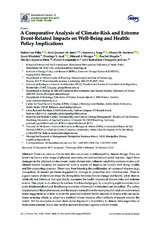A comparative analysis of climate-risk and extreme event-related impacts on well-being and health : policy implications

View/
Date
2018-02-13Author
Leal Filho, Walter
Al-Amin, Abul Quasem
Nagy, Gustavo J
Azaiteiro, Ulises M
Wiesböck, Laura
Ayal, Desalegn Y
Morgan, Edward A
Mugabe, Paschal
Aparicio-Effen, Marilyn
Fudjumdjum, Hubert
Chiappetta Jabbour, Charbel Jose
Metadata
Show full item recordAbstract
Abstract. There are various climate risks that are caused or influenced by climate change. They are known to have a wide range of physical, economic, environmental and social impacts. Apart from damages to the physical environment, many climate risks (climate variability, extreme events and climate-related hazards) are associated with a variety of impacts on human well-being, health, and life-supporting systems. These vary from boosting the proliferation of vectors of diseases (e.g., mosquitos), to mental problems triggered by damage to properties and infrastructure. There is a great variety of literature about the strong links between climate change and health, while there is relatively less literature that specifically examines the health impacts of climate risks and extreme events. This paper is an attempt to address this knowledge gap, by compiling eight examples from a set of industrialised and developing countries, where such interactions are described. The policy implications of these phenomena and the lessons learned from the examples provided are summarised. Some suggestions as to how to avert the potential and real health impacts of climate risks are made, hence assisting efforts to adapt to a problem whose impacts affect millions of people around the world. All the examples studied show some degree of vulnerability to climate risks regardless of their socioeconomic status and need to increase resilience against extreme events.
